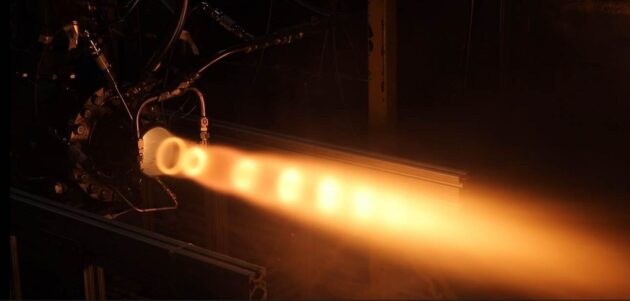
Reaction Dynamics completes regen-cooled hybrid rocket engine testing
by CM Staff
This achievement represents a milestone for the company as it advances in its efforts towards the qualification of its rocket technology.

30 seconds test firing of the RE-101, December the 18th 2023. Joliette, Québec (CNW Group/Reaction Dynamics Lab Inc.)
MONTREAL — Reaction Dynamics reports the successful completion of a thirty-second hot fire, featuring the demonstration of a regeneratively cooled nozzle. This hot firing marks the conclusion of the development testing phase for the RE-101 hybrid rocket engine.
This achievement represents a milestone for the company as it advances in its efforts towards the qualification of its rocket technology. Designed and built by Reaction Dynamics, the RE-101 underwent its inaugural test in early 2021 and is the first hybrid propulsion system to ever have a regeneratively-cooled thrust chamber assembly. This design reportedly serves as an effective mitigation strategy against nozzle erosion in hybrid propulsion systems, preventing performance degradation throughout the ascent phase of the flight.
Bachar Elzein, CEO & CTO, expressed his confidence in the functionality of the rocket engine according to its design, stating, “The successful validation of regenerative cooling holds considerable significance; this test allowed us to address the last major technical risk in our propulsion system, thereby concluding our development testing phase. This accomplishment is a testament to the hard work and dedication of our team.” He further added, “We can now progress to the subsequent phase with confidence. All involved should take pride in this achievement.”
Maxime Goulet-Bourdon, co-founder and COO, expressed his excitement, stating, “We’re one step closer to our goal of launching the first Canadian orbital rocket, and the world’s most efficient hybrid rocket engine. The gradual technology development performed over the last 5 years allowed us to achieve this world first.”
This thirty-second hot fire test, from ignition sequence to shutdown, represents the culmination of three years of development, testing and demonstrations on the RE-101 program. During this period, the company has conducted over fifty hot fires, covering four design iterations. This rigorous regimen aimed to gather essential data for anchoring performance models, validating ignition parameters, assessing fuel characteristics, and determining the restartability of the system. All these efforts collectively contribute to the comprehensive validation of the overall design.
The focus now turns to preparations for qualification testing, with an inaugural flight scheduled to take place within the framework of the Aurora test program in the last quarter of 2024.